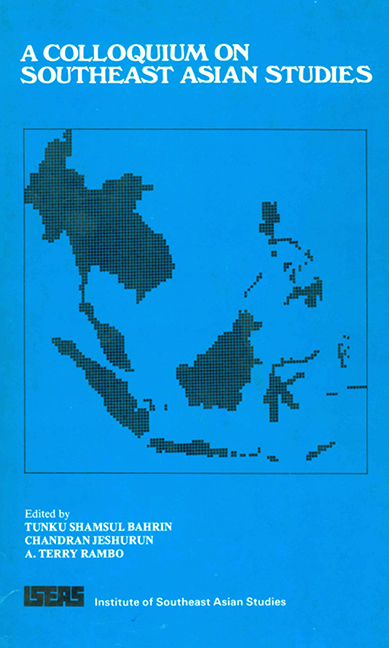Book contents
- Frontmatter
- Contents
- Foreword
- Preface
- Acknowledgements
- Introduction
- Contributors
- PART I TEACHING AND RESEARCH
- PART II ENVIRONMENT AND DEVELOPMENT
- 15 Environment and Development: The Place of Human Ecology in Southeast Asian Studies Programmes
- 16 Environment and Development in Southeast Asia: Trends, Themes and Issues
- 17 Development, Environmental Quality and the Quality of Life in Peninsular Malaysia
- 18 Environment Implications of the Mekong Development Programme
- 19 Development and Environment in Thailand
- 20 Review of Environmental Affairs in Indonesia
- 21 Research and Teaching on Human Ecology in Malaysia
- 22 Human Ecology in the Philippines: Developments in Research, Teaching and Applications
- 23 Environment Education Needs within A Southeast Asian Studies Programme
24 - The Man and Biosphere Programme (MAB) in Asia and the Social Sciences
from PART II - ENVIRONMENT AND DEVELOPMENT
Published online by Cambridge University Press: 21 October 2015
- Frontmatter
- Contents
- Foreword
- Preface
- Acknowledgements
- Introduction
- Contributors
- PART I TEACHING AND RESEARCH
- PART II ENVIRONMENT AND DEVELOPMENT
- 15 Environment and Development: The Place of Human Ecology in Southeast Asian Studies Programmes
- 16 Environment and Development in Southeast Asia: Trends, Themes and Issues
- 17 Development, Environmental Quality and the Quality of Life in Peninsular Malaysia
- 18 Environment Implications of the Mekong Development Programme
- 19 Development and Environment in Thailand
- 20 Review of Environmental Affairs in Indonesia
- 21 Research and Teaching on Human Ecology in Malaysia
- 22 Human Ecology in the Philippines: Developments in Research, Teaching and Applications
- 23 Environment Education Needs within A Southeast Asian Studies Programme
Summary
Introduction
The Man and Biosphere Programme is an interdisciplinary programme of research which aims “to develop the basis within the natural and social sciences for the rational use and conservation of the resources of the biosphere and for the improvement of the global relationship between man and the environment”. This major objective was established by the International Co-ordinating Council for MAB at its first session in November 1971. MAB includes fourteen major project areas:
Ecological effects of increasing human activities on tropical and subtropical forest ecosystems.
Ecological effects of different land uses and management practices on temperate and mediterranean forest landscapes.
Impact of human activities and land use practices on grazing lands: savanna and grassland (from temperate to arid areas).
Impact of human activities on the dynamics of arid and semiarid zones' ecosystems, with particular attention to the effects of irrigation.
Ecological effects of human activities on the value and resources of lakes, marshes, rivers, deltas, estuaries and coastal zones.
Impact of human activities on mountain and tundra ecosystems.
Ecology and rational use of island ecosystems.
Conservation of natural areas and of the genetic material they contain.
Ecological assessment of pest management and fertilizer use on terrestrial and aquatic ecosystems.
Effects on man and his environment of major engineering works.
Ecological aspects of urban systems with particular emphasis on energy utilization.
Interactions between environmental transformations and the adaptive, demographic and genetic structure of human populations.
Perception of environmental quality.
Research on environmental pollution and its effect on the biosphere.
Project areas 1, 2, 3, 4, 5, 6, 7 and 11 have a specific geographic basis while the others relate primarily to human intervention and other processes occurring in all parts of the biosphere; there is therefore an interaction between these two types of project areas.
Good progress has already been made in the establishment of a worldwide network of protected areas, or biosphere reserves, for the conservation of species and genetic diversity and for use in a programme of monitoring research and training on a variety of ecosystems, both natural and man-modified.
- Type
- Chapter
- Information
- A Colloquium on Southeast Asian Studies , pp. 302 - 319Publisher: ISEAS–Yusof Ishak InstitutePrint publication year: 1981



